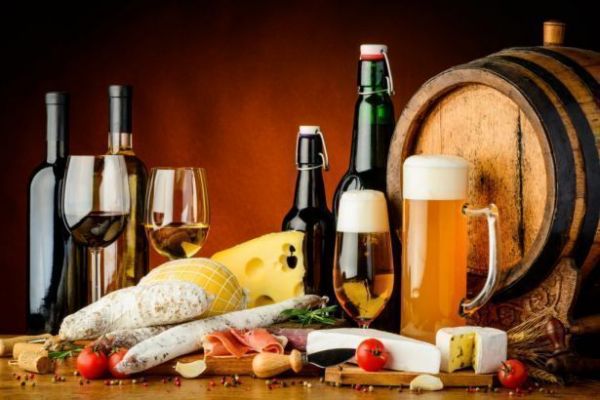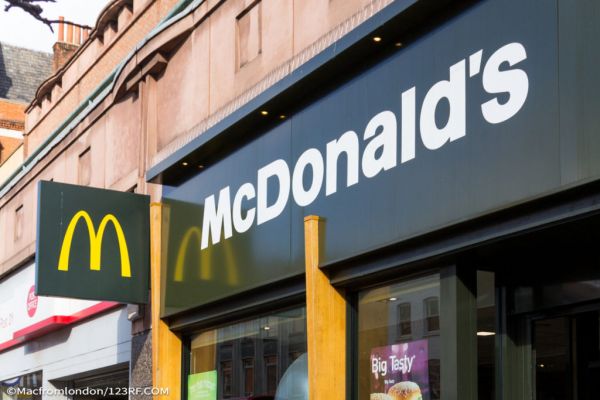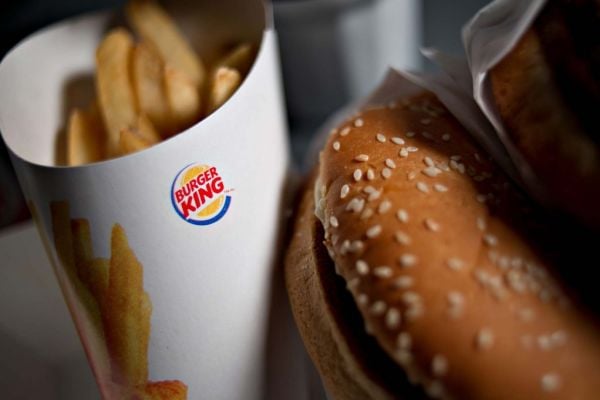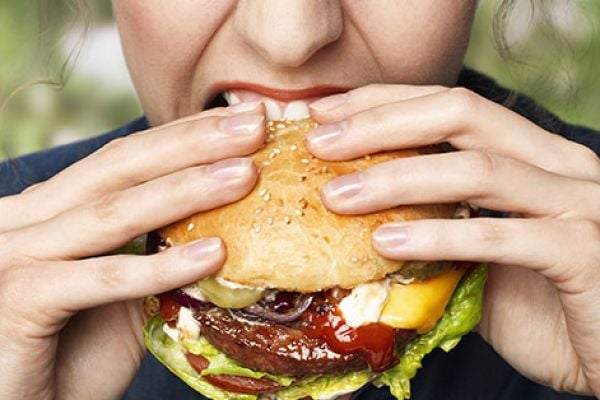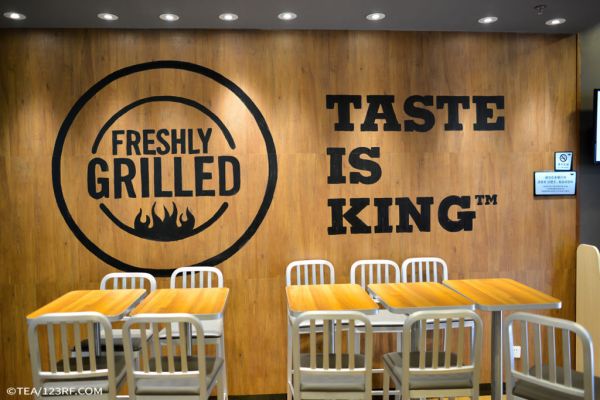Hospitality Ireland presents a round-up of global drinks, pub, restaurant and food news.
Carlsberg Lifts Profit View As Beer Sales Recover In Europe And China
Danish brewer Carlsberg raised its full-year profit guidance on Wednesday October 27 after reporting third-quarter revenue slightly above expectations, helped by a recovery of beer sales in Europe and China.
The world's third-largest brewer now expects operating profit to grow by between 10% and 12% this year, up from 8-11% previously.
"We're satisfied with the value and volume growth in the third quarter," Chief Executive Cees 't Hart said in a statement. "It is encouraging that many beer markets in Europe are recovering from the pandemic."
Sales in China continued a "positive trajectory", while beer markets in Laos, Vietnam, Malaysia and Singapore declined due to coronavirus lockdown measures, Carlsberg said.
The announcement comes after rival Heineken reported a steeper than expected decline in third-quarter beer sales earlier on Wednesday October 27.
The Dutch brewer said that Asia-Pacific sales were down more than a third after COVID-19 restrictions cut volumes.
Carlsberg increased organic sales by 7% in the quarter, beating analyst expectations of 6%, helped by 13% growth in Asia.
Third-quarter sales rose 14% to 19.74 billion Danish crowns ($3.09 billion), compared with 19.31 billion forecast by analysts in a poll compiled by the company.
Shares in Carlsberg have risen 10% since the beginning of the year and were up 0.8% on the day at 1143 GMT.
The company said it would launch its fourth quarterly share buyback programme this year on Thursday October 28 amounting to 1.25 billion crowns.
Coca-Cola Raises Profit Forecast As Strong Soda Sales Counter Cost Pressures
Coca-Cola Co raised its full-year profit forecast on Wednesday October 27, banking on higher prices and demand for its sodas globally to counter rising costs due to supply chain disruptions.
The company's shares rose 2.3% to $55.70, as a rebound in demand for its soft drinks, due to the reopening of public venues such as theaters, stadiums and restaurants across the world, led to a 16% jump in third-quarter revenue.
While demand is expected to remain strong, Chief Financial Officer John Murphy said Coca-Cola was not immune to cost inflation in 2022 or the business impact of potential new lockdowns in some markets due to a spike in COVID-19 cases.
"We do see the world emerging from the crisis a bit like an earthquake. You get more aftershocks, but the consequent aftershocks tend to be smaller than the early ones. And that's kind of how we see 2022," Murphy said.
The beverage giant said it would rely on more marketing expenditure to boost demand, as well as higher prices to get around any potential "aftershocks" related to the pandemic.
Other companies, including rival PepsiCo Inc and consumer goods giant Procter & Gamble Co, have said that they would have to increase prices again to counter the impact of surging commodity and freight costs.
"A lot of the things Coke has done operationally, like reduce the number of products that they have and focus on faster growing products, should help at least mitigate some cost inflation," Edward Jones analyst John Boylan said.
The company expects its annual adjusted earnings per share to rise 15% to 17%, compared with a prior forecast of a 13% to 15% increase.
On an adjusted basis, Coca-Cola earned 65 cents per share in the third quarter, beating estimates of 58 cents, according to IBES data from Refinitiv.
Britain's Pubs Boosted By Major Overhaul Of Alcohol Taxes
British finance minister Rishi Sunak announced what he called the biggest cut in taxes on beer in decades and the most radical simplification of alcohol duties in over a century in a boost to pubs as they struggle to recover from the coronavirus pandemic.
In his budget statement, Sunak said the current system of alcohol taxes, which dates back to 1643, was outdated and too complicated as he outlined a new principle, which will see some stronger drinks become more expensive.
Sunak told parliament that a planned increase in taxes on spirits, wine, cider, and beer will be cancelled from Thursday. The freeze in alcohol taxes and the simplification of duties will lower taxes by between £565 million and £775 million pounds.
"Our reforms make the alcohol duty system simpler, fairer and healthier," Sunak said.
The cuts will spare voters another hit to their income at a time when inflation is the highest in almost a decade and some people have suffered lower wages as businesses were forced to close last year during the pandemic.
Pubs in Britain have faced some of the strictest restrictions of any industry during the pandemic, including months of mandatory closures, curfews, and a requirement that drinkers only be served if they have ordered a substantial meal.
Shares in pub operators were boosted by the tax changes, with JD Wetherspoon, Mitchells and Butlers and Marston's all trading up more than 5%.
In a measure he said would help pubs struggling because of the effect of the pandemic, Sunak announced "draught relief", cutting the tax on drinks served from pumps with the average cost of a pint falling by 3 pence.
Sunak said this would result in the biggest beer tax cut in 50 years and the biggest cut on cider duty since 1923.
The number of alcohol duties rates will be cut from 15 to six as part of the changes.
The new taxes based on the strength of the drink will see duties increase on some higher alcohol products, such as some red wine and white ciders.
However, consumers of some lower-strength products, such as fruit ciders, liqueurs, beers and wines will pay less.
McDonald's Sales Soar On Higher U.S. Prices, Newer Menu Items
Higher U.S. prices and celebrity-themed meals boosted quarterly comparable sales at McDonald's Corp , though the company struggled to keep restaurants open at full capacity amid labor shortages and COVID-19 outbreaks, it reported on Wednesday October 27.
U.S. same-store sales grew 9.6% in the third quarter ended Sept. 30, compared with estimates for 8.27%, according to Refinitiv IBES data.
Global comparable sales also jumped 12.7% in the quarter versus estimates of 10.31% as international markets slowly recovered from the pandemic.
Shares in the world's largest burger chain rose about 2.2% to $241.70 in late morning trading.
The U.S. labor shortage caused some locations to close early and lose speed of service, Chief Executive Chris Kempczinski said in an earnings call, adding problems were not "unsolvable."
McDonald's has had to push back some new restaurant openings into early 2022 in part because global supply-chain problems made it difficult to get kitchen and tech equipment. That caused new unit development in the United States and some international markets to be "down a little bit" from how many the company had expected to open this year, Kempczinski said.
Seating areas remained closed in about 20% of McDonald's American locations - roughly 3,000 restaurants - in regions with high rates of COVID-19.
Even so, some pandemic-related restrictions have eased, luring more customers into restaurants. McDonald's crispy chicken sandwich and latest celebrity partnership with rapper Saweetie also boosted sales.
The Chicago-based company has also raised U.S. prices about 6% versus 2020 to help cover rising commodity and labor costs. Higher prices, combined with larger order sizes, drove sales.
Most restaurant chains, including Chipotle Mexican Grill Inc, are charging more on menus to protect their margins against higher costs for everything from payroll to beef and chicken.
McDonald's forecast current-quarter U.S. comparable sales to post low double-digit growth on a two-year basis.
The fast-food chain, which has been seeking to grow sales digitally, launched a new loyalty program in the United States that now has over 21 million members enrolled, while also doubling down on advertising.
Most of the company's international markets also returned to sales growth, especially the UK, Canada and Japan, as coronavirus-related restrictions eased, while Australia and China sales continued to be pressured by the resurgence of COVID-19 cases.
Kempczinski said IBM Corp will acquire McD Tech Labs, which was created after McDonald’s 2019 acquisition of Apprente, an artificial intelligence company working on automating drive-thru orders.
Net income rose 22% to $2.15 billion and the company earned $2.76 per share on an adjusted basis, beating estimates of $2.46 per share.
AB InBev Raises Forecast After Brazil Drives Surprise Profit Rise
Anheuser-Busch InBev, the world's largest brewer, upgraded its forecast for 2021 earnings growth on Thursday October 28 after posting a surprise increase in third-quarter profit, buoyed by beer sales in Brazil.
The maker of Budweiser, Corona and Stella Artois said it expects core profit or EBITDA (earnings before interest, tax, depreciation and amortisation) to grow between 10% and 12% in 2021, compared with an 8%-12% growth forecast earlier.
The Belgium-based company's shares were up 7.3% at €52.94 at 0800 GMT on Thursday October 28, making them clearly the strongest performers in the FTSEurofirst 300 index of leading European shares, although they are still 20% down from a mid-June peak.
Some analysts had raised concerns about AB InBev even meeting its original guidance. Broker Nomura noted the new guidance was the brewer's first upgrade in several years after it outperformed expectations in every region in the third quarter.
AB InBev said core profit rose 3.0% on a like-for-like basis in the July-Sept period, against an expected 2.3% drop, according to a company-compiled poll.
It said revenue grew 15.3% in Brazil as consumers drank more and purchased higher-priced beers.
Revenue and profits were also higher in Colombia and South Africa, reflecting easing of COVID-19 restrictions, and in Europe as vaccination rates increased.
However, they declined in the United States, where there were supply chain disruptions, as well as in Mexico, a year on from post-lockdown inventory replenishment, and in China, where COVID-19 restrictions disproportionately hit its key regions.
AB InBev's results follow mixed earnings reported by its rivals on Wednesday October 27.
Carlsberg, the world's number three brewer, raised its 2021 profit forecast after higher-than-expected third-quarter revenue, helped by recovery in Europe and China.
By contrast, global number two Heineken reported a steeper-than-expected drop in beer sales in the third quarter, hit by a lockdown in Vietnam, while retaining its forecast for full-year results at below pre-pandemic levels.
From Beers To Cars, German Consumers Face Higher Prices
German consumers face a rise in prices for goods across the board as more and more companies in Europe's largest economy pass on higher production costs, driven by widespread supply shortages and a spike in energy prices.
While the development is helping firms to improve corporate margins after the coronavirus shock, consumers are feeling the pinch of higher prices, which could hurt household spending and ultimately domestic demand if wage growth is not keeping up.
In its latest business sentiment survey, the Munich-based Ifo institute said on Monday October 25 that every second industrial firm in Germany is already planning to hike prices due to persistent supply problems, a record high.
Consumer price inflation, harmonised to make it comparable with other euro zone countries, accelerated in October at an unprecedented pace of 4.6% on the year, from 4.1% in the previous month, data showed on Thursday October 28.
The reading was the highest recorded since January 1997, when the EU-harmonised series began.
For 2021 as a whole, the government expects the national inflation rate to reach 3%, the highest in nearly three decades, before easing to 2.2% in 2022 and 1.7% in 2023.
Thanks to state aid measures to cushion the effects of the pandemic, the government hopes that consumers' disposable income will rise by 2.5% this year and 3.8% next, which could help stabilise domestic demand despite the price surge.
But for many consumers, the unusually high inflation is being felt nonetheless, with doubts growing that the price hike will only be temporary as suggested by central bankers.
Germany's largest brewery, the Radeberger Group, said it plans to raise its beer prices next spring in two stages for both the hospitality and retail industries due to the rising costs of utilities, logistics and raw materials.
"These cost increases can no longer be compensated for by simply increasing efficiency," a Radeberger spokesperson said.
"We therefore feel compelled to pass on these cost explosions with a sense of proportion, at least in part, in our sales prices," the spokesperson said.
Bars, restaurants and hotels will have to pay more for beer from Feb. 1 onwards, while beverage retailers and supermarkets will face a price hike from May 1 onwards.
The Radeberger spokesperson declined to comment on a report in food industry magazine Lebenmittel Zeitung which said the brewer was eyeing an average price increase of up to 6%.
Other large breweries, including Krombacher and Veltins, have also announced plans to increase beer prices in spring.
In the automobile sector, a scarcity of microchips and other electronic components is driving up production costs, putting the brakes on production and enabling manufacturers such as BMW to grant smaller discounts than normal.
Economy Minister Peter Altmaier said on Wednesday October 27, when presenting the government's reduced growth outlook, that auto makers are currently not able to build hundreds of thousands of cars due to the lack of semiconductors.
The scarce supply and limited output means that car manufacturers have to make fewer concessions on prices when selling new models and re-selling leasing vehicles.
"BMW and Mercedes are compensating a large part of the lost volume with a better product mix and higher prices," analysts from Stifel Research said in a research note.
A BMW spokesperson said last month that the market for leasing vehicles had developed more favourably over the course of the year than initially expected.
Other German companies planning to pass on higher raw material and energy costs to clients include Nivea maker Beiersdorf, forklift manufacturer Jungheinrich and construction material specialist HeidelbergCement.
Among manufacturers of consumer products, German sportswear company Puma said on Wednesday Ocotber 27 that supply chain issues, compounded by higher raw material costs, could feed through to higher prices in the second half of 2022.
In the short term, the supply chain problems could lead to empty shop shelves ahead of the Christmas season, Puma Chief Executive Bourn Gulden warned, adding, "I told my wife: If you want to buy Christmas presents, you should buy now."
Taco Bell, KFC Sales Power Yum's Results Beat As Pizza Hut Lags
Taco Bell owner Yum Brands Inc beat Wall Street estimates for quarterly revenue and profit on Thursday October 28, as strong demand for its fried chicken and tacos cushioned the blow from a slowdown in sales at its Pizza Hut chain.
The company also benefited from customers returning to its restaurants in the United States, Canada and Europe following vaccinations, even as rising concerns over the Delta variant of the coronavirus kept consumers away from its chains in other markets.
Chipotle Mexican Grill and McDonald's have also delivered a strong beat in the third quarter, aided by product price hikes and the reopening of seating areas in their restaurants.
"We did see a return to dine-in, yet we saw digital sales go up ... that is still something that is going to continue to grow for us," Yum Brands Chief Executive Officer David Gibbs said on a call with analysts.
Taco Bell, which reintroduced its breakfast menu in the quarter, delivered an 8% jump in system sales - which excludes the impact of foreign currency translation - while KFC's sales were up 3% in the United States.
However, Yum Brands' Pizza Hut division saw its U.S. system sales drop 2% in the quarter, as pizza chains grapple with a slowdown in delivery demand following a surge during last year's lockdowns.
Shares of the company were down 1% at $124.81.
Earlier this month, rival Domino's Pizza Inc posted its first drop in U.S. same-store sales in over a decade amid a tight labor market that created a shortage of drivers.
Yum Brands said it was well-positioned to tackle rising industry-wide inflation and growing labor shortages.
The company reported an adjusted profit of $1.22 per share on revenue of $1.61 billion, beating estimates of $1.08 per share on revenue of $1.59 billion.
Shares In Brazilian Brewer Ambev Soar As Profits Jump In Q3
Shares in Brazilian brewer Ambev SA soared on Thursday October 28 after it reported a quarterly net profit of 3.71 billion reais ($660.89 million), up 57.4% from a year earlier, as the reopening of bars and restaurants drove sales higher.
Chief Executive Jean Jereissati said during a conference call that he was confident Ambev's earnings before interest, taxes, depreciation, and amortization (EBITDA) will be back at 2019 levels this year, or maybe even higher, despite expectations that a weakening real and higher commodities prices should keep pressure on results in the fourth quarter.
Ambev's shares were up 7.5% to 16.35 reais in afternoon trading, making it the top gainer in the Bovespa index, as investors and analysts welcomed the company's quarterly figures.
Ambev, part of Belgium's Anheuser-Busch InBev SA, said it has recorded its highest volumes ever for a third quarter, with a 7.7% organic rise year-on-year to 45.7 million hectoliters.
The company also highlighted a 20.8% annual rise in its net revenue to 18.49 billion reais, while adjusted EBITDA grew 7.8% to 5.47 billion reais.
Credit Suisse analysts praised Ambev's results, saying the firm has notched a stellar performance with volumes at an all-time high, in a research note titled, "They did not know it was impossible so they did it".
Analysts at Bank of America said the results came in stronger than expected, buoyed by the reopening of the economy and share gains. They cautioned, however, that there are still some relevant headwinds projected for 2022.
"While the short-term scenario for demand is constructive, we see a deterioration of the consumption environment in 2022 and competition picking up in Brazil, with new capacities coming online in the next few years, while FOREX volatility and high costs should remain headwinds," BofA said.
Mexico's Alsea Beats Net Profit Estimates In 2021 Rebound
Mexican restaurant operator Alsea on Thursday October 28 reported net profit of 173 million pesos ($8.4 million) in the third quarter, far outdoing analyst estimates as it credited a rebound in sales after the pandemic's toll on the dining industry.
The company, which operates franchises of coffee chain Starbucks as well as Domino's Pizza, Burger King and others, posted a loss in the third quarter last year.
The improvement was due to lower costs resulting from "the recovery in sales after reduced restrictive measures related to the pandemic," Chief Executive Alberto Torrado said in a statement.
The company posted revenue in the July-to-September period of 13.96 billion pesos, in line with analyst estimates and up from 9.9 billion pesos a year earlier.
As in previous quarters, Starbucks and Domino's Pizza saw some of the best growth across Alsea's markets.
Alsea's sales from delivery orders increased 18%, representing nearly a fifth of total sales. Torrado said the company expected deliveries would stay strong even after COVID-19 restrictions are completely lifted.
"The pandemic has generated a permanent change," he said.
The company noted it was still working to pull past the effects of the pandemic, especially in its casual and family restaurants.
Alsea began the year with a loss in the first few months, before turning a profit in the second and third quarters.
"We are working hard to recover traffic," Torrado said. "We are sure that as people go back to work in their offices ... the company figures will improve, contributing to growth in the last quarter of the year."
Starbucks Sales Miss As COVID-19 Resurgence Hits China
Starbucks Corp missed market estimates for quarterly same-store sales on Thursday October 28, as a COVID-19 resurgence in China closed stores in several major cities and overshadowed a strong performance by its U.S. business.
Fresh lockdowns to curb the spread of the Delta variant in Starbucks' largest growth market of China have also hit businesses of several other restaurant chains, including Yum China Holdings Inc.
The coffee chain posted a 7% decline in China comparable sales in its fourth quarter, missing its forecast of roughly flat growth and offsetting a 22% jump in the United States.
The company forecast global comparable sales growth in the high single digits in its current fiscal year 2022.
Shares fell more than 4% in aftermarket trading.
But Chief Executive Officer Kevin Johnson also said higher prices, higher wages, new unit development, automation in stores, speedier cooking equipment and other investments will help it beat rivals and push its operating margin to its ongoing target of 18% to 19% in fiscal 2023.
"This is the time to take that market share that we know we can take, and that market share gain is permanent," Johnson said in an earnings call.
The company said it would open 2,000 net new locations globally in fiscal 2022 versus 1,173 in 2021, about 75% of them outside of the United States.
Johnson declined to say how much Starbucks would raise prices on Pumpkin Spice Lattes and other menu items.
But he said that "we are taking price and we will continue to take price in an inflationary environment."
The chain will also invest in equipment - like warming ovens and cold brew systems - to speed up operations and let workers perform other tasks.
On Wednesday October 27, Starbucks said it would raise pay for U.S. workers with at least two years of employment and offer $200 referral bonuses, as it grapples with a nationwide labor shortage.
Starbucks is also closing some locations early in order to redeploy staff to other stores, Chief Operating Officer John Culver said during the call.
The coffee chain also committed to $20 billion of share repurchases and dividends over the next three years.
Analysts say the pressure in China should be temporary as restrictions ease and Seattle-based Starbucks opens more stores in the world's second-largest economy to boost growth.
Global comparable sales rose 17% in the quarter ended Oct. 3, compared with analysts' average estimate of 18.5% growth, according to Refinitiv IBES data.
Starbucks earned $1 per share on an adjusted basis - narrowly beating estimates of 99 cents.
Coca-Cola To Fully Acquire Gatorade Rival BodyArmor For $5.6bn
Coca-Cola Co said on Monday November 1 it would buy the remaining stake in BodyArmor it did not already own for $5.6 billion, as the soda maker amps up its sports drink portfolio to take on market leader, PepsiCo Inc's Gatorade.
The deal marks a shift in strategy for the world's largest beverage maker after it spent the last year offloading or discontinuing brands, including its own energy-drink brand, to focus on Coca-Cola sodas.
The deal, which values BodyArmor at about $6.59 billion, is Coca-Cola's largest for a single brand; It comes about three years after the company bought British coffee chain Costa for $5.1 billion.
BodyArmor, which markets itself as electrolyte-filled energy recovery drink for athletes, currently makes about $1.4 billion in annual retail sales and has a 50% growth rate, Coca-Cola said.
"It gives Coke a strong stable of products in the rapidly growing sports hydration category. It's a nice premium brand that has opportunity for expansion over time," Edward Jones analyst John Boylan said about BodyArmor that gained popularity after basketball star Kobe Bryant backed it in 2013.
However, Boylan believes the massive deal would only "give Coke a solid No. 2 position in an attractive category".
Coca-Cola, which had first acquired a 15% stake in BodyArmor in 2018, said the brand's co-founder Mike Repole will stick around after the deal to advise on the marketing and packaging of products.
At the time Coca-Cola took its initial stake, BodyArmor was valued at $2 billion, according to a Sunday October 31 Wall Street Journal report.
The deal comes as Coca-Cola and rival PepsiCo face immense supply chain bottlenecks, forcing the companies to raise prices to counter higher freight and raw material costs. PepsiCo has even said it has had to deal with a shortage of Gatorade bottles.
BODYARMOR CO-FOUNDER MIKE REPOLE SAYS COKE "WILL LET ME CONTINUE RUNNING BODYARMOR"- CNBC INTERVIEW
Red China: Up-And-Coming Wineries Gain Recognition
Chinese winemaker Legacy Peak, which started producing grapes more or less by accident in 1997, symbolises the rapid growth of an industry that now wins accolades in global markets, but it once came close to giving up.
"We wanted to pull out all the vines and call it quits," said Liu Hai, its second-generation owner, recalling early struggles to cultivate a barren plot received from a local government in payment for construction work.
His family knew nothing about farming when they got the land in the arid north-central region of Ningxia on condition that it be devoted only to grapes, but they started making wine a decade ago, after wineries that used their fruit won several awards.
Since then, Liu says the winery has won awards and found export markets in France, Germany and southeast Asia, despite annual output of fewer than 100,000 bottles.
From the rolling hills of coastal Shandong province to the desert heights of Ningxia and the deep valleys of southwestern Yunnan, Chinese vineyards and wineries are winning recognition.
"China is an up-and-coming fine wine producer, and its best wines can compete on the world stage," said wine educator Edward Ragg, who is a reviewer for the influential Robert Parker Wine Advocate.
The products of wineries such as Chateau Nine Peaks in Shandong, Silver Heights and Grace Vineyard in Ningxia, and Ao Yun in Yunnan, are rated as "outstanding wine of exceptional complexity and character" by Parker's newsletter.
Some, such as Nine Peaks and Legacy Peak, are finding export markets in Asia and Europe.
China's wine market is the sixth largest in the world, with event organiser Vinexpo saying it consumed $14.8 billion worth of wine in 2018, and forecasting sales of $18 billion by 2023.
But domestic wineries must battle an image problem, as consumers at home can be suspicious of their quality and often put off by high prices.
"It was always easier to sell to foreigners because they are more open-minded, but it has been a tough sell with Chinese customers," said Liu.
Other problems are high production costs and erratic weather that can hamper efficiency and quality, while a slowing economy and the COVID-19 pandemic have hit China's wine consumption since 2018.
Modern winemaking in China dates fromg the 1980s, when French firms, such as the precursor of Remy Cointreau, began investing after the door was opened to foreign businesses by then-leader Deng Xiaoping.
While the French influence persisted in a market dominated by reds and a glut of Bordeaux imitations, quality began improving in the early 2000s.
That was a time when vineyards focused on growing healthier grapes just as incomes grew sharply, with more people traveling abroad and drinking more wine.
Now home-grown wineries can allay the suspicions of some consumers, such as Yang Lu, who owns a restaurant in the Chinese capital.
"I was amazed by how the aroma was full of nice fruits and flowers," said Yang, describing her experience last year of first sampling the Mountain Wave label produced in Ningxia.
"It had a nice colour and was smooth with a long finish."
Until then, Yang, who is in her 30s, educated overseas and widely travelled, had almost always ignored domestic wines, uncorking only imports such as New Zealand wines made from pinot noir.
Some winemakers, such as Ian Dai, 33, who is behind the Ningxia brand Xiaopu, priced in the range from 168 yuan ($26) to 300 yuan ($47), are turning away from industrial methods in the search for a Chinese signature variety.
Dai said he was looking to more natural methods, such as fermenting without commercial yeast or leaving acidity and tannin levels unadjusted to "let grapes express themselves".
An independent with no vineyards or winemaking equipment of his own, Dai is in his fifth year of winemaking after dropping out of college in Sydney and spending a decade in wine sales.
Dai hopes to find grape varieties for a wine that represents China.
"As a winemaker I should have the ego to make the best wine in this climate with grapes grown here," said Dai, who expected it would take two decades to produce such a wine in China.
Chinese wineries are also experimenting with alternative grape varieties, such as marselan, aglianico and saperavi.
Marselan, a cross between cabernet sauvignon and grenache embraced years ago by Legacy Peak and others, offers high yields and a fruitiness much needed by Chinese reds, experts say.
"Marselan could one day become China’s signature wine grape, like malbec is to Argentina," added Ragg, a holder of the Master of Wine qualification.
News by Reuters, edited by Hospitality Ireland. Click subscribe to sign up for the Hospitality Ireland print edition.
